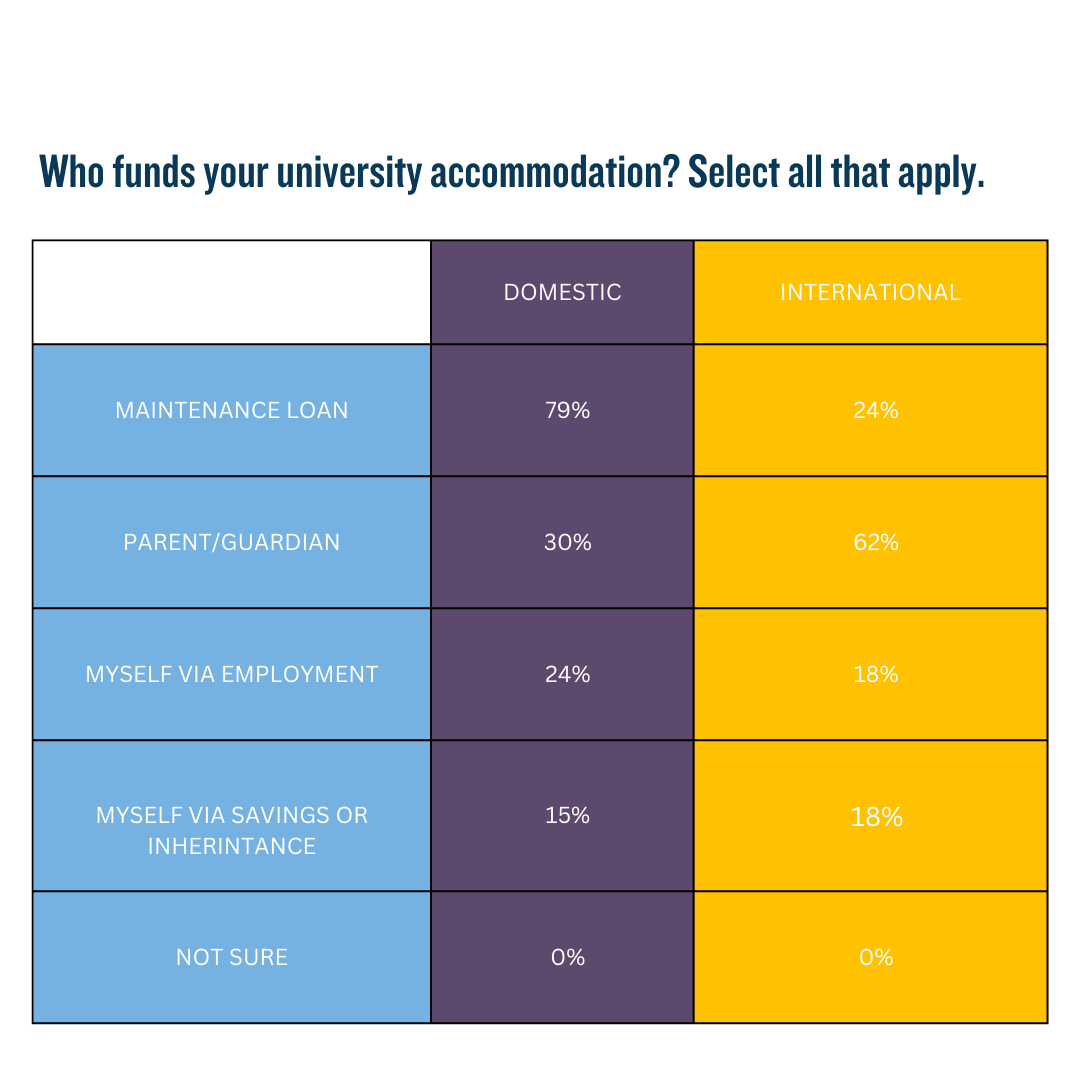Differences in Accommodation Preferences & Opinions – International vs Domestic Students in the UK
Of the International students who took our survey, 24% were post-graduate, compared to the 5% of Domestic students. This follows the figures covered by UniversitiesUK which says that international students make up 15% of undergrads and nearly 40% of post-grads.
It is therefore worth noting that many of the below trends may be influenced by the age and maturity of post-graduate students, rather than solely related to the nationality of the survey takers.
WEALTH
The largest difference uncovered by our survey is in the source of wealth for the payment of University accommodation –
79% of domestic students rely on Maintenance loans to pay for their accommodation, compared to only 24% of international students.
62% of international students receive money from parents or guardians to pay for their accommodation, compared to 30% of domestic students.
CURRENT ACCOMMODATION
Half of these international students are living in university halls (7% more than domestic students) – presumably in top end halls, as international students were 15% more likely to have an ensuite bathroom, 13% more likely to have 24/7 security, and 11% more likely to have a gym & high-speed internet.
EXPECATIONS FOR FUTURE ACCOMMODATION
The trend of high-end living continues into their desires for their future. International students were more likely to think the below luxury features would be important for their housing over the next 5 years. International students are also more likely to say they will choose where to live based on their career (54% vs 41%), which might help them pay for the additional features they are seeking.
EXPECTATIONS OF LANDLORDS
The higher expectations of international students are further demonstrated in their opinions of their landlords and what they should provide. For a start, 77% of domestic students say they would have no problem living somewhere with second-hand furniture, but only 63% of international students felt it was acceptable. International students are more likely to believe landlords should host events for tenants (37% vs 22%) and provide exercise space (34% vs 22%). The only feature important to significantly fewer international students than domestic students is access to recycling facilities (52% vs 68%).
SOCIALISING AT HOME
With meditation areas, ensuite bathrooms and personal kitchens all being more frequently important to international students, their preferences veer further towards the home being a private, peaceful space they don’t have to share with others.
This is further demonstrated in their preferences regarding relaxing and eating at home – 61% of international students said they would rather be alone when relaxing at home, 18% more than domestic students. 41% said they would rather eat alone than with others – less than half, but still 8% more likely than domestic students.
SOCIALISING OUT OF THE HOME
This isn’t to say that international students are reclusive, across the board (aside from ‘cleaning tips’) international students say they would be more interested in attending events if their landlord or community hosted them. Most notably, international students are significantly more interested in events related to food and exercise than their domestic counterparts.
Furthermore, International students report having socialised with non-students whilst at university more often. 75% said they had taken part in local, non-student events (compared with 63% of domestic students), and 71% said they socialise with non-students (compared with 59% of domestic students).
HOME TECH IN THE FUTURE
The final significant difference between international and domestic students in the study was their opinion on VR and how it will influence home life in the next 10 years. 65% of international students believed that the metaverse and VR would change the way we think of and use our homes, whereas domestic students were more split on the issue, with 52% believing in significant change.




